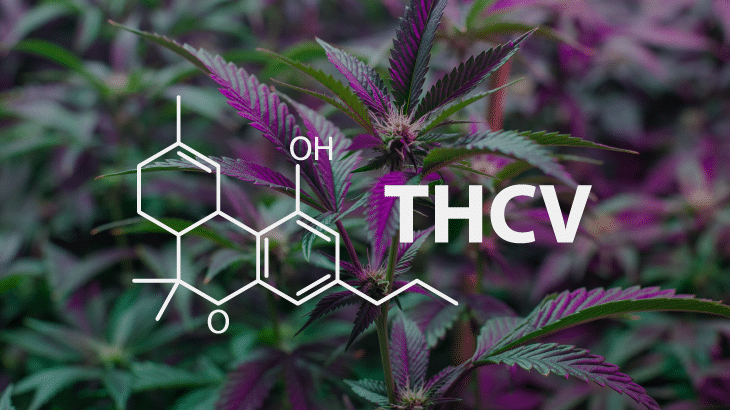When most people think of cannabis, they immediately think of THC and CBD—two of the most well-known cannabinoids. But there’s another lesser-known cannabinoid that is gaining attention for its potential health benefits: Tetrahydrocannabivarin (THCV). Although it doesn’t receive as much mainstream attention as its counterparts, THCV is proving to be a powerful compound with unique effects that may benefit both the body and mind. In this post, we’ll take a closer look at what THCV is, its potential benefits, and how it differs from THC.
1. What is THCV?
THCV is a naturally occurring cannabinoid found in cannabis plants, particularly in certain strains of Sativa. Structurally similar to THC (tetrahydrocannabinol), THCV shares some similarities with THC, but it also has its own distinct properties and effects. THCV is present in smaller concentrations than THC, but its potential health benefits have caught the attention of researchers and cannabis enthusiasts alike.
Unlike THC, which is well-known for its psychoactive effects (getting “high”), THCV is often considered to be less psychoactive at low doses. It may actually have the opposite effect of THC in certain situations, making it an intriguing compound for those seeking cannabis with unique therapeutic properties.

2. THCV and Appetite Control
One of the most exciting aspects of THCV is its potential ability to suppress appetite. While THC is known for stimulating hunger (often referred to as the “munchies”), THCV seems to work in the opposite direction. Studies suggest that THCV may help reduce appetite, making it a potentially valuable tool for those looking to manage their weight.
This appetite-suppressing property of THCV is especially appealing for individuals seeking an alternative to traditional weight management supplements. THCV has been shown to activate the CB1 receptor in a way that may help regulate hunger signals, potentially reducing overeating and cravings. As a result, it has gained interest as a potential compound for managing food intake and supporting healthy weight loss.
3. Boosting Metabolism and Fat Burn
In addition to its appetite-suppressing effects, THCV has also been shown to support metabolism and fat-burning processes. By activating certain receptors in the endocannabinoid system, THCV may encourage the body to burn fat more efficiently. Some studies have suggested that THCV could increase the body’s ability to metabolize stored fat, leading to greater fat utilization for energy.
For those looking to enhance their metabolism and improve weight management, THCV could provide an all-natural solution that complements a healthy diet and exercise routine.
4. Cognitive Benefits of THCV
Another intriguing aspect of THCV is its potential cognitive benefits. Research suggests that THCV may enhance mental clarity, focus, and cognitive function. At low doses, THCV may have stimulating effects, helping users feel more alert and engaged in their tasks. Some users also report improved mental clarity and the ability to concentrate better on work or study.
THCV has also been studied for its potential neuroprotective effects. Early research has shown promise in using THCV to protect brain cells, potentially helping with conditions such as Alzheimer’s disease and other neurodegenerative disorders. Although more research is needed to fully understand its effects on the brain, THCV could become a valuable tool for supporting cognitive health and preventing cognitive decline.

5. Reducing Anxiety and Stress
While THC is often associated with increased anxiety in some users, THCV appears to have the opposite effect. Some studies suggest that THCV may have anxiolytic (anxiety-reducing) properties, helping to reduce feelings of stress and anxiety. This makes THCV a potentially useful compound for people seeking relief from anxiety without the psychoactive side effects commonly associated with THC.
The calming effects of THCV could be beneficial for those looking for a more balanced cannabis experience—one that provides relaxation without the risk of paranoia or anxiety. THCV may be particularly useful for individuals who experience anxiety in social situations or during high-stress periods.
6. THCV vs. THC: Key Differences
While THCV and THC share similar molecular structures, their effects on the body and mind are quite different. THC is well-known for its psychoactive effects, producing a “high” that can alter perception, mood, and cognition. In contrast, THCV is less likely to induce a strong “high” at lower doses and may even counteract some of the negative effects of THC, such as paranoia or anxiety.
At higher doses, THCV may have mild psychoactive effects, but they are typically much less intense than THC. This makes THCV a promising option for those seeking therapeutic benefits without the overwhelming euphoria and altered perception caused by THC.
THCV is a fascinating cannabinoid that offers a range of potential benefits, including appetite suppression, increased fat burning, improved cognitive function, and anxiety reduction. As interest in the compound grows, more research will likely uncover additional therapeutic applications for THCV, making it an exciting area of exploration in the world of cannabis.
If you’re looking for a natural way to support weight management, enhance focus, or reduce anxiety, THCV could be a valuable addition to your wellness routine. As with any supplement, it’s important to consult with a healthcare provider before trying new cannabinoids, especially if you have pre-existing health conditions.



